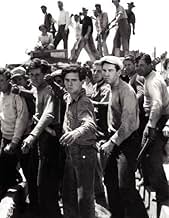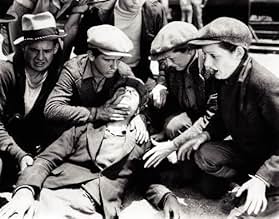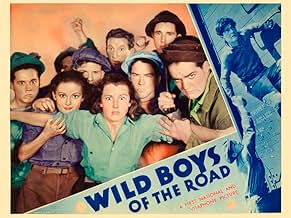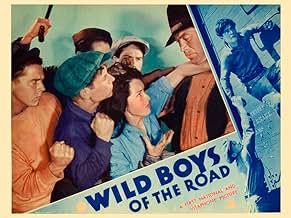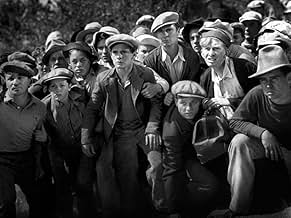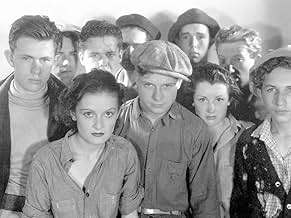In the depths of the Depression, two teenage boys strike out on their own in order to help their struggling parents and find life on the road tougher than expected.In the depths of the Depression, two teenage boys strike out on their own in order to help their struggling parents and find life on the road tougher than expected.In the depths of the Depression, two teenage boys strike out on their own in order to help their struggling parents and find life on the road tougher than expected.
- Awards
- 1 win total
- Sally
- (as Dorothy Coonan)
- Boy
- (uncredited)
- Police Sergeant
- (uncredited)
- Policeman in Court
- (uncredited)
- Brakeman Throwing Stones
- (uncredited)
- Youth in Line-up
- (uncredited)
Featured reviews
The movie wouldn't work so well without the contrast the first half-hour provides. Darro and friends are typical middle-class teens, fun-loving and care-free. It's a world of proms, necking parties, and harmless pranks. Then without warning things change. Why they change is never really explained which is the way it should be. For most kids knew nothing of stock markets and dis-investment. They only knew that suddenly Dad doesn't go to work anymore and mom cries a lot, bills pile up, and no one gets a job, anywhere. Middle-class privilege plunges into no-income poverty, and Darro and his buddy do like millions of others. They hop a freight, hoping the next town, the next state, the next someplace, will give them a chance to make a living. What they get instead are private armies, battalions of cops, and a forest of billy clubs. They're driven on to the next jurisdiction and the next welcoming committee. Nobody wants the footloose unemployed adding to their own local problems. Maybe the attitude's not charitable, but it makes practical sense.
The battles atop freight cars and in hobo jungles are expertly filmed and dynamically staged, a stark panorama of social desperation. These scenes make up the movie's centerpiece. If anything they're mildly presented compared to the actual blood-letting that surrounded the desperate and up-rooted. Union organizing was especially bloody and bitterly fought-- an explosive topic Hollywood has only timidly touched on over the years. Nonetheless, the nail-biting episode on the train track stands-in for at least some of the actual pain and suffering caused by those crisis years.
Darro may be small, but he's energetic, something of a younger Cagney. His determined spirit to keep going no matter what is convincing, and helps drive the others on. I expect it also had that effect on audiences of the day. I like the way director Wellman suggests the kids can set up their own constructive community, if given half-a-chance. Some reviewers complain about the final scene with the understanding judge. Yes, it is pretty contrived, but it wasn't unrealistic given the package of New Deal reforms then in the works. If those measures didn't exactly solve the economic crisis (only WWII did that), they at least offered hope that the problems would no longer be kicked down the road to the next jurisdiction.
Wild Boys may not be the most honest or best movie on those tumultuous years. Still, it does furnish a provocative and entertaining glimpse. In any event, some books should not remain closed. After all, who knows when the unfortunate history of that era may again repeat itself.
*** 1/2 (out of 4)
William A. Wellman directs this Depression era drama about two boys (Frankie Darro, Edwin Phillips) who run away from home and jump on the railroad route in hopes of finding a job so that they can help their families back home. Once again there must have been something inside of Wellman because there's a lot of passion in this film aimed at the poor who must do what they can to try and survive. This is a very hard hitting film that looks at this kids in a very serious light and it makes for a terrific little gem that deserves more attention than it's gotten within film history. Both Darro and Phillips are terrific in their roles and the chemistry they offer is great. Wellman's future wife, Dorothy Coonan, is also very good in her role as the boys buddy. The first twenty-minutes of the film shows the boys as normal teenagers but then we see their parents lose their jobs and thus forcing them to hit the road. This set up really sells the rest of the film and it also helps us see the suffering they're going to go through for the rest of the film. Wellman does a great job with the tender side of the story as well as a couple great fight sequences where they boys attack some railroad police as well as a rapist. Darro has a bit of Cagney in him and his performance here seems to have had a major influence on what we'd eventually see from The Dead End Kids.
Frankie Darro and Edwin Phillips portray the juvenile leads Eddie and Tommy, with Darro's performance effective and appealing. Their characters indulge in the usual teenage shenanigans until the depression overtakes their parents. As times toughen, and Eddie's father can't find work, Eddie decides to sell his jalopy to help out. This sets up the first of many splendid scenes, as Eddie's tough-guy veneer drops just long enough to share raw emotions with his father (Grant Mitchell). Zero cringe factor here, Wellman excels at emotions between men and it's never maudlin.
Hitting the (rail)road to find work, Eddie and Tommy encounter Sally, an adorable, nose-scrintching Dorothy Coonan dressed as a man. And the three set off across the country, with high ideals and optimism clashing with depression realities. Brutal and raw, this is a journey you, too, must take. A page of America's history told so expertly as to make you laugh and cry simultaneously.
Ms. Coonan (Sally) quit films after "Wild Boys" to marry director "Wild" Bill Wellman, and remain his his wife until his death in 1975. My highest recommendation.
Storyline
Did you know
- TriviaThe movie shown in the movie theater scene (about an hour into the film) is another Warner Bros. release, Footlight Parade (1933).
- GoofsSally's piece of cake jumps from the plate into her hands between shots.
- Quotes
Eddie: [to the judge] I knew all that stuff about you helping us was baloney. I'll tell you why we can't go home: because our folks are poor. They can't get jobs and there isn't enough to eat. What good will it do you to send us home to starve? You say you've got to send us to jail to keep us off the streets. Well, that's a lie. You're sending us to jail because you don't want to see us. You want to forget us. But you can't do it because I'm not the only one. There's thousands just like me, and there's more hitting the road every day.
Tommy: [also to the judge] You read in the papers about giving people help. The banks get it. The soldiers get it. The breweries get it. And they're always yelling about giving it to the farmers. What about us? We're kids!
- ConnectionsFeatured in Alibi Mark (1937)
- SoundtracksThe Gold Diggers' Song (We're in the Money)
(uncredited)
Music by Harry Warren
[Played after the kids leave the dance; also whistled by Eddie (Frankie Darro)]
- How long is Wild Boys of the Road?Powered by Alexa
Details
- Release date
- Country of origin
- Language
- Also known as
- Junaci Pavlove ulice
- Filming locations
- Southern Pacific Taylor Yard, Glendale, California, USA(train yard sequence)
- Production company
- See more company credits at IMDbPro
- Runtime1 hour 8 minutes
- Color
- Sound mix
- Aspect ratio
- 1.37 : 1
Contribute to this page



